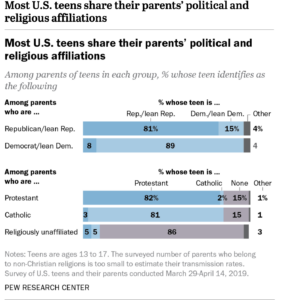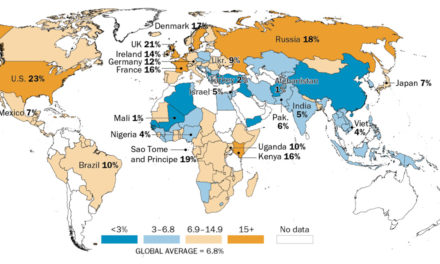Most assume parental influence is declining when it comes to passing on religious faith and political conviction to the next generation. But the best research shows this assumption is wrong, and dramatically so.
The fact that parents are actually quite successful at passing on their faith and political convictions to their children is explained in a new research brief from the Institute for Family Studies (IFS). This organization found, “Most parents pass along both religious and political affiliations to their children at high rates.” They add, “It should not surprise us that politics and religion are transmitted efficiently across the generations” from parent and grandparents to children.
Parents likely find it surprising that research shows their success rate in passing on both religious and political convictions is just over 80 percent in general.
Parents are more than twice as likely to say it is “extremely or very important” for their children to take up their religious convictions than their political convictions, indicating parents have their priorities right in matters of eternal significance. IFS adds that evangelical parents are positively unique in this regard, explaining, “Almost by definition, evangelical parents care more than others” as “70% of white evangelicals find intergenerational [faith] transmission important” compared to only 8% of unaffiliated parents who say it is “extremely or very important” that their children remain unaffiliated faith-wise.
It should not be missed that family is indeed a powerful influence upon how children turn out, across all important domains of human well-being. Laurie DeRose, a senior research associate at IFS explains, “Sociologists have shown that education, fidelity and infidelity, poverty and wealth, generosity, divorce, workaholism, and criminality all run in families.” She adds, “If the apple doesn’t fall far from the tree in so many domains, perhaps it should be no surprise that politics and religion are transmitted efficiently across the generations as well.”
The data source IFS is drawing from is the Pew Research Center, a generally excellent and trusted source for such topics. In their original report, Pew asks, “Which are American parents more likely to pass along to their kids – their religion or their politics?”
Their answer? “Turns out, most parents pass along both kinds of affiliation, and they do so at similarly high rates.” Pew’s data graph looks like this:

Parents are Irreplaceable in Faith Transmission, with No Close Second
Faith transmission from parent to child is quite efficient. Children are simply not walking away from their parents’ faith in droves, as some are claiming. In this new report, Pew explains, “82% of Protestant parents had teens who also identified as Protestant, 81% of Catholic parents had Catholic teens, and 86% of religiously unaffiliated parents – those who described themselves as atheist, agnostic or nothing in particular – had teens who were also ‘nones.’”
As Glenn T. Stanton notes in his book The Myth of the Dying Church, “more young adults attend biblically faithful churches than attended nearly fifty years ago.” He adds, “According to some of the best sociological data, the percentage of young adults regularly attending evangelical and nondenominational churches has roughly doubled between 1972 and today.”
And Pew is not new, nor alone, in highlighting the singular importance of parents in young people coming to and remaining in the faith. The leading secular sociologists of religion in the world have understood this for some time and they hold parental influence has no close second.
University of Southern California’s Vern Bengtson explains this well in Faith and Families: How Religion is Passed Down Across Generations, published by Oxford University Press. His 35-year-long research finds three major truths:
- Religious families are surprisingly successful at faith transmission.
- The extent to which religious families are successful in passing on their faith to younger generations appears to have remained stable over time.
- Grandparents are more important than previously recognized.
Professor Bengtson adds, “In short, our results indicate that the decline in parental influence assumed by many has not occurred in religious belief and practices.”
Another leading scholar in sociology of religion, Christian Smith of Notre Dame, working from one of the largest and must robust data sets in the world on intergenerational faith transmission, comes to the same very positive conclusions in his book Handing Down the Faith: How Parents Pass Their Religion on to the Next Generation, also published by Oxford University Press.
Smith and his research team tell us the “most causal influence on the religious lives of American teenagers and young adults is the religious lives of their parents.” He adds, “Not their peers, not the media, not their youth group leaders or clergy, not their religious school teachers.” The truth is, Smith explains,
Myriad studies show that, beyond a doubt, the parents of American youth play the leading role in shaping the character of their religious and spiritual lives, even after they leave home and often for the rest of their lives. (emphasis in original)
And Smith’s newer research agrees with Bengtson’s in that “this parental influence has not declined in effectiveness since the 1970s.”
Theologically Conservative Parents Do Best
On top of this, the kind of theological approach parents take matters.
Sociologist Jesse Smith, working from Penn State University, published a major academic paper explaining that “religious transmission is stronger among children of religious conservatives than any other group” and “differences in transmission are largely explained by religious conservative parenting approaches, congregational involvement, and most importantly, more intensive religious socialization.” This is academic talk for what Christians call “discipleship.”
Parental approaches and temperaments matter. Jesse Smith adds, in contrast to more liberal faith traditions, “Conservative Protestants, for instance, have been shown to exhibit high parental warmth, low verbal aggression, and authoritative parenting styles [in contrast to authoritarian styles] in raising their children, and this pattern is better explained by theological beliefs than denominational affiliation.”
All of this research should serve as a great encouragement to parents and ministry professionals: Parents are a child’s greatest and most effective evangelist and this influence has not declined in recent times. Churches do best when they come alongside parents to encourage and equip them in this vital task.
Photo from Shutterstock






